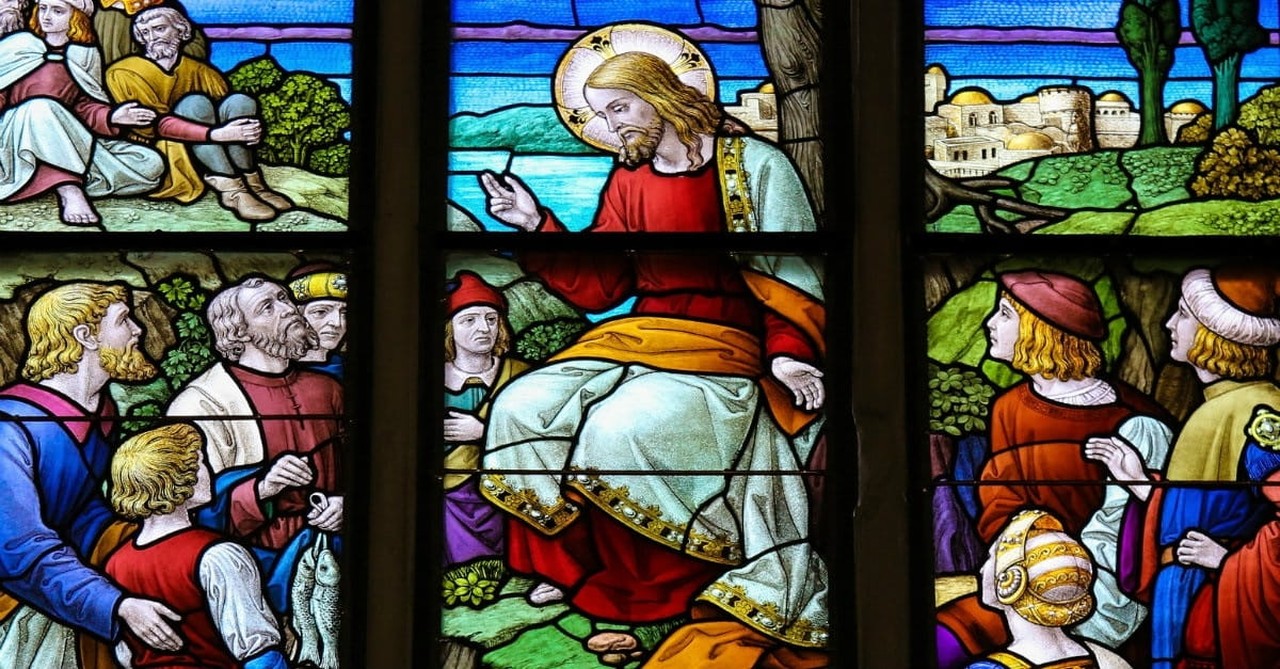
I wrote a funny little picture book once. It was a rollicking rhyme about Noah and the flood where Noah had lost his animals and was now looking for them in wacky places like in a sock drawer and under a shoe. Charming, right?
And then came Hurricane Katrina.
Watching the devastation of that city-killer, I was suddenly embarrassed. I’d never write funny picture books about Hurricane Katrina. So why did I write one about the drowning of a planet?
My one consolation is knowing I’m not the only person who avoids uncomfortable realities of Scripture. We do it every day in church, at Sunday school, and in our small group Bible studies. So here’s my little penance: I’m going to tell you today, briefly, about the nine Bible stories you’ll never hear in church.
Photo credit: Unsplash.com
1. Moses divorces his wife, and marries a black woman. (Exodus 18:1-7; Numbers 12:1)

1. Moses divorces his wife, and marries a black woman. (Exodus 18:1-7; Numbers 12:1)
SLIDE 1 OF 9
What Happened:
You know the popular stuff: Baby Moses in a basket. Adopted son of Pharaoh. Miraculous liberator of slaves, and so on.
You may also know the romantic part of Moses’ story: He rescued the helpless Zipporah and her sisters from menacing shepherds, and was rewarded with Zipporah as his wife for life (Exodus 2:16-22). The part of that most pastors leave out, though, is the stuff that went on inside his marriage tent.
Apparently, Moses and Zipporah lived a somewhat rocky marriage. Exodus 18:2 finally reports (after the fact) that “Moses had sent away his wife Zipporah… and her two sons.” >Numbers 12:1 also reveals he later married a nameless black woman from Cush (roughly modern-day Sudan)—and that Moses’ brother Aaron and sister Miriam were fiercely opposed to that multiethnic union.
Why You’ll Never Hear it in Church:
The fact that Moses divorced and remarried goes against the later teachings of Jesus—so most church leaders today simply omit that part of his life.
What to Talk about if You Do:
- The Bible makes no moral comment on Moses’ divorce. What’s your take on that?
- Moses’ second wife was of a different race. Thoughts?
Photo credit: ©Thinkstock/heywoody
2. Jesus compares a woman to a dog. (Matthew 15:21-28)

2. Jesus compares a woman to a dog. (Matthew 15:21-28)
SLIDE 2 OF 9
What Happened:
The account recorded in Matthew 15:21-28 seems so out of character for our compassionate Christ that it’s actually disturbing.
A desperate woman comes begging Jesus for hope. “Have mercy on me,” she says, “my daughter is demon-possessed and suffering.” Jesus does less than nothing; he actively ignores her, pretending she doesn’t exist.
She keeps pleading, apparently for hours, until Christ finally acknowledges her. “Lord help me!” she begs. His rejection is an insult: “It’s not right to take the children’s bread and toss it to the dogs.” Ouch!
In the end, this mother gets her miracle, but Jesus never explains why he called her a dog, made her grovel and wait, and emotionally bludgeoned her relentless hope in him.
Why You’ll Never Hear it in Church:
Let’s see… Jesus appears to be insulting and demeaning toward women. Why do you think no one teaches this story in church?
What to Talk about if You Do:
- How do you explain Jesus’ behavior here?
- Why did Matthew include this event in Jesus’ story?
Photo credit: ©Thinkstock/Jorisvo
3. Cursing Psalms (Psalm 109:6-15; Psalm 137:9)

3. Cursing Psalms (Psalm 109:6-15; Psalm 137:9)
SLIDE 3 OF 9
What Happened:
The Book of Psalms is stunningly beautiful… and hateful. Mixed within passages of inspirational poetry are a number of cursing, “imprecatory” prayers. Consider Psalm 109:6-15:
“May his children be fatherless and his wife a widow… may his children be wandering beggars… may a creditor seize all he has… may no one extend kindness to him or take pity on his fatherless children…”
Or Psalm 137:9: “Happy is the one who seizes your infants and dashes them against the rocks.”
Psalms 7, 35, 55, 58, 59, 69, 79, 109, 137 and 139 all contain these kinds of evil-wish prayers. You can bet you’ll never dig into those verses at church.
Why You’ll Never Hear it in Church:
Didn’t you see the part about dashing babies against rocks? These are hateful, hurtful prayers. It’s just too difficult to exposit them humbly and honestly.
What to Talk about if You Do:
- What questions would you like to ask God about cursing Psalms?
- What do you do when you feel like unleashing an imprecatory prayer?
Photo credit: ©Thinkstock
4. Benjamites enslave young women. (Judges 21)

4. Benjamites enslave young women. (Judges 21)
SLIDE 4 OF 9
What Happened:
Alright, this is just messed up, so be ready for that.
The tribe of Benjamin was one of the 12 Tribes of Israel. At one point (Judges 19), men from this tribe gang-raped a woman to death. War ensued, the Benjamites lost, and their entire tribe was cut off.
Before long, the others tribes felt sorry for their rapist-cousins who now had no women to marry. So… the Israelites ordered 12,000 soldiers to go to Jabesh-Gilead and: “Kill every male and every woman who is not a virgin.” That left 400 young girls who were captured and condemned to Benjamite sex slavery.
There still weren’t enough women for the Benjamites, so the leaders of God’s people told their rapist cousins to go to Shiloh and: “When the young women of Shiloh come out to join in the dancing, rush from the vineyards and each of you seize one of them to be your wife.” And that’s exactly what happened.
Why You’ll Never Hear it in Church:
This brutal, ISIS-like concept of violently capturing young girls and forcing them into sex and domestic slavery is kind of off-putting, don’t you think?
What to Talk about if You Do:
- How would you discuss Judges 21 with your teen daughter?
- How does knowing this history affect your own faith today?
Photo credit: Unsplash.com
5. Saul hires a witch. (1 Samuel 28:3-25)

5. Saul hires a witch. (1 Samuel 28:3-25)
SLIDE 5 OF 9
What Happened:
Israel’s King, Saul, faced an invasion from the massive Philistine army—and he was afraid. Normally he would’ve consulted God’s prophet Samuel for advice. But Samuel was dead, so…
Saul hired a witch to call up Samuel’s spirit from the grave.
Next thing you know, Saul’s in Endor where the town medium does indeed call up Samuel’s spirit from the afterlife. Samuel is nonplussed. He delivers a scathing prophecy promising battlefield defeat and telling Saul that “the Lord has departed from you and is become your enemy… tomorrow you and your sons will be with me.”
Everything happened just as the dead Samuel prophesied, and by the next day, King Saul had committed suicide on the battlefield.
Why You’ll Never Hear it in Church:
This history includes spiritism, a confusing view of afterlife, and suicide. Still, the real reason you’ll never hear it in Sunday School is because it gives biblical credence to the practice of witchcraft as a (condemned, yet effective) means for speaking with the dead.
What to Talk about if You Do:
- Witchcraft is expressly condemned in Scripture (see Leviticus 20:6)—yet Saul did it anyway. What makes that a dangerous attitude for people today?
- Why do you suppose God allowed Saul to call up the dead prophet Samuel?
Photo credit: ©Thinkstock
6. God attempts to murder Moses. (Exodus 4:24-26)

6. God attempts to murder Moses. (Exodus 4:24-26)
SLIDE 6 OF 9
What Happened:
Figure this one out if you can: Moses has been living as a shepherd in Midian, and bam! God appears in a burning bush, commissioning him to return to Egypt and set free the children of Israel. All good so far.
Moses obeys God, takes his family, and heads toward Egypt. Then, without any preface or explanation, Exodus 4:24 happens: “At a lodging place on the way, the Lord met Moses and was about to kill him.”
The Bible doesn’t say why God attempted murder on Moses, but it must’ve had something to do with failure to observe the covenant rite of circumcision. Exodus 4:25-26 tells us that his wife “Zipporah took a flint knife, cut off her son’s foreskin and touched Moses’ feet with it… So the Lord let him alone.”
Why You’ll Never Hear it in Church:
This is just a strange episode to our 21st century ears. There’s not enough background to explain why God suddenly intended to kill Moses, nor why the child’s foreskin was required to spare Moses’ life.
What to Talk about if You Do:
- What goes through your mind after reading a biblical event like this?
- God needs no defenders, but what explanations might there be for his actions here?
Photo credit: Unsplash.com
7. God kills young boys. (2 Kings 2:23-25)

7. God kills young boys. (2 Kings 2:23-25)
SLIDE 7 OF 9
What Happened:
The prophet Elisha was walking up to the town of Bethel when:
“Some boys came out of the town and jeered at him. ‘Get out of here, baldy,’ they said. ‘Get out of here, baldy!’ He turned around, looked at them and called down a curse on them in the name of the Lord. Then two bears came out of the woods and mauled forty-two of the boys. And he went on to Mount Carmel…”
Why You’ll Never Hear it in Church:
God’s severe punishment doesn’t seem to fit the triviality of the crime, nor does Elisha’s callous disregard for the lives lost.
What to Talk about if You Do:
- What do you think we’re missing in this history?
- What will you do to discover more about the background and circumstances described here?
Photo credit: ©Thinkstock/elinedesignservices
8. Books of the law (Leviticus and Deuteronomy)

8. Books of the law (Leviticus and Deuteronomy)
SLIDE 8 OF 9
What Happened:
Most of us sigh with relief when we read Paul’s declaration in Romans 6:14: “You are not under the law, but under grace.” Any why not? Much of the law is oddly specific and difficult to justify by modern standards, including prohibitions on tattoos and haircuts (Leviticus 19), laws about ritual sacrifice (Leviticus 1), and laws about clean and unclean food (Deuteronomy 14).
Because of that, we tend to interpret Romans 6:14 to mean, “Disregard any parts of the Old Testament that make you feel uncomfortable” and we ignore entire biblical books like Leviticus and Deuteronomy. We’d be wise to remember that Paul also told us: “Do we, then, nullify the law by this faith? Not at all! Rather, we uphold the law” (Romans 3:31).
Why You’ll Never Hear it in Church:
God’s ancient Law is just too confusing, and often not relevant to us today.
What to Talk about if You Do:
- What place do books like Leviticus and Deuteronomy have in the Christian life?
- How do we live “under grace” while refusing to “nullify the law by this faith”?
Photo credit: ©Thinkstock/pamela_d_mcadams
9. Jesus promises violence for his followers. (Matthew 10:16-25)

9. Jesus promises violence for his followers. (Matthew 10:16-25)
SLIDE 9 OF 9
What Happened:
Jesus gathered his disciples and prepared them to go preach about him. Before they left, he promised them this:
“… You will be handed over to the local councils and be flogged in the synagogues… You will be hated by everyone because of me… If the head of the house has been called Beelzebul [Satan], how much more the members of his household!”
Why You’ll Never Hear it in Church:
We just don’t like to hear that Jesus promised his followers suffering and hardship. We prefer a steady diet of Scriptures that boost our self-esteem and promise health, wealth, and happiness.
What to Talk about if You Do:
- What’s your impression of Jesus’ promises here?
- How does Matthew 10:16-25 fit with God’s promises of prosperity?
Mike Nappa is an entertainment journalist at PopFam.com, and author of the book God in Slow Motion.
Photo credit: ©Thinkstock/kevinschreiber
Originally published July 28, 2017.







